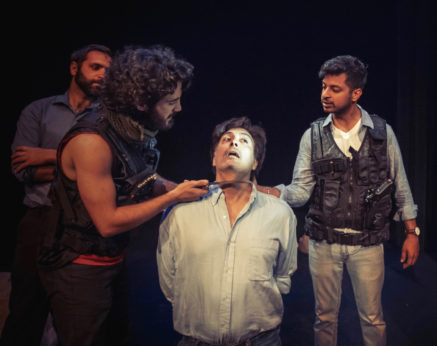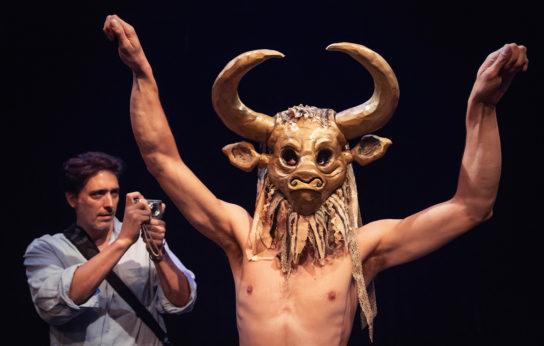
LOS ANGELES—Two plays recently premiered in L.A. on war themes. Infidel is about the ISIS-type resistance to the American war on Iraq; and Many May Not Return, set in the Vietnam War era, reflects the complex relationship in the Mexican-American community with the concept of national military service as recalled in three wars—the current one, Korea, and World War II.
Terror in the name of religion
A certain amount of hype is expected in the promotion of a new play—or anything for that matter. I thought People’s World readers would be interested in a work by Polish émigré actor, director and writer Christopher Vened, announced as: “A suspense thriller that explores religious superstition and terror in the name of Islam versus unscrupulous Western imperialism and warmongering.” The blurb goes on to summarize: “When an American anthropologist is kidnapped in Baghdad by seemingly ruthless fundamentalists, an exchange of ideas with his captors evolves into a spiritual quest for the meaning of faith.”
About the only truthful words in that statement are “an American anthropologist is kidnapped in Baghdad.” Maybe Vened had all those heady notions in mind when he set out to write his play, but what I saw on stage (Sept. 2) is very far from the balanced, even-handed, provocative, reflective, challenging dialogue promised. It is entirely one-sided, barely touching on the war itself, its nature or its causes—the words “oil,” “Bush” and “crusade” are never mentioned.
The anthropologist John Norton (Ted Monte) is the principal Western character—his wife back home in Seattle is heard only briefly on the telephone, as is the receptionist at the American embassy in Baghdad (both voiced by Rebecca Robertson-Szwaja); and there are brief appearances by Ambassador Robert Compte (Edwin Scheibner), who stands firm that the U.S. government does not negotiate with terrorists. After a short opening scene in which the scholarly museum curator Ahmad (Michel Wakim) is seen giving Norton the grand tour of ancient gods of the Fertile Crescent, which interests Norton as a university professor of Sumerian, Akkadian, Assyrian and Babylonian cultures, the rest of the cast are all Muslim terrorists.
The Muslims—Zakir (also played by Michel Wakim), Amir (Bobak Cyrus Bakhtiari), Jamil (Ronak Gandhi), Kasim (Nima Jafari), and Myiesha (Aneesha Madhok), the only woman among them—are all brutal, cruel, violent, threatening, humiliating, gun-toting criminals. Only Myeisha shows a little kindness in trying to make their captive’s circumstances just a bit more comfortable. The Zakir character is an educated Muslim who is nevertheless woefully confined in his knowledge of the world to just what he learned from the Koran—which, incidentally, Norton, the Middle East culture specialist, has never read!

When Norton reads aloud from a cuneiform tablet in his possession that he claims he purchased from the Baghdad Museum for $75,000 for an American museum, his Muslim listeners are mildly impressed, but since it is pre-Islamic, it is but a worthless slab of clay. Zakir listens to Norton recite the ancient flood story from the Tale of Gilgamesh (ca. 2100 BCE) and disputes its veracity because it conflicts in some detail with the story of Noah in the Bible, which is also sacred to Muslims.
Conclusion: The white Western anthropologist is far better informed about the ancient history of Iraq than the Iraqis are, and the Iraqis are willfully and punitively ignorant with no redeeming qualities. Norton has no perceptible human flaws or contradictions—despite the many questions that could be asked about why he chose to visit Iraq in the middle of the war, how he came to purchase the ancient artifact, and indeed whether or not he really might have had some ulterior purpose as his accusers say.
If the Muslims are all despicable human beings (the curator excepted), is it even remotely conceivable that the ransom money the terrorists are seeking from Norton might buy arms with which to defeat the American invaders who hollowed out civil society in Iraq and created chaos out of order? The stereotypes swarm the stage like sand flies. I’m still shaking them out of my clothes.
Amir, one of Norton’s guards, speaks with a broad working-class British accent. He is apparently a convert and he is married to Myiesha, who speaks with a nonspecific Midwest American accent. Who are they and what are they doing in this ISIS lookalike outfit? A mystery.
Now it’s possible, just faintly, that Vened modeled his Iraqi characters after the characteristics of the various gods from ancient civilizations to whom we are briefly introduced at the museum. If so, his point is both too tenuous and too weakly supported to bother thinking about any further.
The more fundamental question to ask is if this is even a play. Over the course of 90 minutes (no intermission) of what can only be described as torture pornography, no one, and I mean no one, takes stock of their received beliefs, questions who they are and what they’re doing, tries to see the situation from another point of view. The characters we see at the beginning are the characters we see at the end. No one changes, no one is transformed, and neither are we in the audience. If you come in hating Muslims you’ll go out hating them even more. If you come in hating rote fundamentalism (of any stripe) as well as war and violence and imperialism and stereotyping whole religions and peoples with one broad brush of contempt, then you’ll leave, as I did, thinking, “Wow, I thought theatre was supposed to get us to interrogate ourselves a bit, unsettle us, make us a little less complacent in our views, help us to empathically understand people and cultures that are not our own.”

Infidel felt more like a xenophobic diatribe than a piece of theatrical literature worthy of public performance. Why does the blurb call the fundamentalists “seemingly ruthless?” That implies there’s more to their story than we presuppose. But there isn’t.
The production values were decent: As Norton in the museum clicked photos of the gods Ahmad was showing him, they showed up on the big screen behind the stage. And a cute cartoon version of the flood story provided a running illustration of the tale Norton related. The imagery also included plenty of scenes of butchery against human beings and violence against priceless art from pre-Islamic times. The Bull of Heaven, a primordial monster who predated even the most ancient of the gods, appeared live on stage (Moses Leon Norton).
As actors, the cast was a mixed bag. Perhaps it’s a sign of a certain talent that I cannot distinguish them from their roles. I know parts are hard to come by, but I do have to wonder what interested these performers in this work. Personally, I would have called the anti-defamation league. The playwright also directed.
Infidel continues through Oct. 7, with performances on Sat. at 8 pm and Sun. at 2 pm. The Whitefire Theatre is located at 13500 Ventura Blvd. in Sherman Oaks 91423. For reservations and information, call (323) 960-7738 or go to www.WhitefireTheatre.com.
Asking Mexican Americans to go to war for the U.S.
If it sounds inhumanly crazy to ask young Muslim men to enlist in a fundamentalist army and quite likely die for the cause, plenty of American young men felt the same way about being drafted to go halfway around the globe and massacre Vietnamese peasants who never did us any wrong.
That is the period evoked in David Trujillo’s play, just over an hour long, Many May Not Return. It had a sold-out three-performance run Friday through Sunday of Labor Day weekend. Trujillo’s play had the character of community theatre: The playwright (who has written for People’s World) financed and produced it with a limited budget; the director and one principal role were family members. In the end ticket sales and some modest community sponsorship enabled the show to cover all its expenses, leaving enough for a small stipend to the actors.
The “anti-war play”—and yes, this actually was a play—grows out of Trujillo’s own family and community experience. He came of age at the time of the Chicano Moratorium during the Vietnam War. Millions of Chicanos in the U.S. started wondering how come proportionally so many more of their young men were being drafted into the military—and somehow couldn’t rely on “bone spurs” to keep them out. And how come Chicano death rates in the war were so much higher than for white soldiers?
Trujillo looks at one California Central Valley farming family and its multi-generational involvement in America’s wars, starting with World War II. In Trujilllo’s telling, it’s not just the men who are called to serve; the young women too, seeing opportunities in the WACS or the medical corps, also want to serve their country. Partly it’s a matter of proving their patriotism, and another part (maybe bigger) is just to get out of the drudgery of arduous farm work, see the world and advance themselves.
When his son Mickey (Damian Gomez) signs up with the Marines headed to Vietnam, Papa (Carlos Lazaritt), a Korean War vet himself, warns, “Many may not return.” Papa returned a decorated soldier only to find that no one would hire him because he was a Mexican. That itself was part of Mickey’s motivation: “I’ve got to get out of this place,” he says, ironically recalling the Vietnam-era Animals’ song “We’ve gotta get outta this place. If it’s the last thing we ever do” that was a favorite among American draftees in Vietnam.
Emiliana (Terry Reyes) keeps sacred the box containing two American flags—one each for family members killed in World War II and Korea. “I don’t want any more flags,” she tells her son.
A roving singer (Ismael Parra) plays a double function: He offers songs from the period, both Mexican ballads and American numbers such as “Where Have All the Flowers Gone?” and reads the poignant letters home from all three wars. “If you miss the train I’m on, you will know that I am gone.”
Trujillo doesn’t fail to include the 1964 Gulf of Tonkin lie that President Lyndon B. Johnson used to drag our country into full-bore hostilities (though never formally declared) against poor Vietnam.
A small but powerful role is the Drill Sergeant (Jay Stapleton) who trains Mickey’s newly married brother Robert (Blake McCormack) when he gets drafted (with a baby on the way). Stapleton evokes all the terrifying shouted commands intended to make a compliant, obedient soldier out of a kid, denigrating him for being Mexican and probably a supporter of the Chicano protest demonstrations. In his letter home, written in the jungle as the Viet Cong encircles him and his sergeant, Robert sounds hopeful that he’ll have “only one more month of this shithole.”
Chandra Anderson and Viv Lozano play daughters in the family who learn some troubling family secrets about their relatives’ war heroism.
Unlike Infidel, which had made its point before it even began, there is a lot of history, and more important, emotion, that could use some further exploration in Trujillo’s play. Compact as it is, that history and emotion are often telegraphed in short, clipped non-linear scenes that span several generations. There’s scant time for characters to lyrically bare their hearts; such poetic scenes might soften the necessary didacticism of so much information needing to be delivered in one short hour.
Direction by David Edward Reyes kept everyone out of each other’s way on the small stage of the Avery Schreiber Playhouse in North Hollywood. With several of his characters he was able to summon authentically felt performances that both recalled eras past and serve as object lessons to the present.










